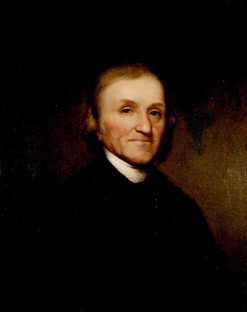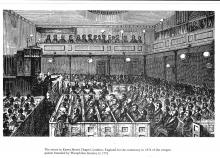Early Unitarianism
 The roots of the Unitarian movement lie mainly in the reformation of the 16th century. At that time people in many countries across Europe began to claim the right to read and interpret the bible for themselves, to have a direct relationship with God without the mediation of priest or church, and to set their own conscience against the claims of religious institutions.
The roots of the Unitarian movement lie mainly in the reformation of the 16th century. At that time people in many countries across Europe began to claim the right to read and interpret the bible for themselves, to have a direct relationship with God without the mediation of priest or church, and to set their own conscience against the claims of religious institutions.
Many people came to question orthodox Christian doctrine and to affirm beliefs of their own. These included:
- the unity or unipersonality of God, as opposed to the doctrine of the Trinity – hence the name ‘Unitarian’;
- the humanity, as opposed to the deity, of Christ;
- the worth of human beings, as opposed to ideas of original sin, inherited guilt and innate depravity;
- the universal salvation of all souls, as opposed to the doctrine that most of humanity is predestined to damnation.
The earliest organised Unitarian movements were founded in the 16th century in Poland and Transylvania. In Britain, Unitarianism was damned as heresy and the death penalty imposed on anyone who denied the trinity. With Unitarianism seen as heresy and specifically forbidden by parliament’s Toleration Act of 1689, several early radical reformers who professed Unitarian beliefs in the 16th and 17th centuries, suffered imprisonment and martyrdom.
The unitarian approach to looking at God as one became more widespread in the Church of England in the 17th century. John Biddle, a Gloucester school-master often called the father of English unitarianism, wrote and spoke extensively on his views and died in prison in 1662. Samuel Clarke, Rector of St James' Piccadilly, came under severe censure when his book, The Scripture Doctrine of the Trinity, appeared in 1712 in which he argued that supreme honour should be given only to God, the Father.
For the rest of the century Unitarianism spread significantly amongst dissenters from the established church, later known as nonconformists. It was then that Unitarian thinking in the UK began to express itself in a church organisation. Some English Presbyterians, whose churches were amongst the oldest in dissent, adopted Unitarianism in the second half of the 18th century, to be followed by the old General Baptists, whose Assembly had been formed in 1653. The term applied to Unitarians at this time was 'rational dissenters'.
Modern Unitarianism

Joseph Priestley (pictured top of this page), the famous scientist and discoverer of oxygen, was the organiser of modern Unitarianism although not before Theophilus Lindsey, Vicar of Catterick, Yorkshire, left the Church of England to found the first avowed Unitarian church in Essex Street, near the Strand in London in 1774. The site remains to this day the headquarters of Unitarianism in Britain.
Unitarianism’s opposition to the state church and its support for the principles of the French Revolution was not popular in Britain, which led to renewed persecution in the 1790s. In America, Unitarianism was a growing force in New England in the late 18th century, where it had evolved out of congregationalism. The USA was to provide the most potent examples of Unitarian thinking and leadership in the first half of the 19th century.
Unitarian churches in the UK were still attacked by orthodox Christians and Unitarianism did not become legal until 1813. It was possibly the only church organisation in the 19th century Christian fold not blown off course by the Darwinian revolution; in fact the movement embraced the new thought as it has, in the main, subsequent scientific advances.
In the 19th century, James Martineau revolutionalised the sterile thinking associated with traditional Unitarian reliance on Biblical texts, taking it forward to a new faith based on reason and the enlightened conscience. Denominational structures were also developed during the 19th century, finally uniting in the present General Assembly in 1928.
This historical information was provided by Alan Ruston.
Genealogy and Historical Queries
Please see our Genealogy and Historical Queries page.
Today
Unitarian movements exist in many countries around the world. Most originated independently by process of spiritual evolution similar to that which occurred in Britain. Many are now linked through the International Council of Unitarians and Universalists (ICUU), founded in 1995.
Visit our Get involved page for more information on joining a local or national Unitarian community, or jump straight into finding a local congregation.
The Unitarianism FAQs contain even more detailed information on all things Unitarian.
